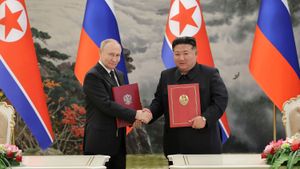In the realm of global security, few concepts are as revered as nuclear deterrence. It's often credited with keeping major powers at peace for over half a century. But what if this widely accepted notion is nothing more than a comforting myth? A recent examination of nuclear deterrence theories has raised significant doubts about their effectiveness and reliability.
Ward Wilson, in his provocative piece, "The Myth of Nuclear Deterrence," questions the fundamental assumptions underlying nuclear deterrence. He argues that the common belief that the threat of city destruction provides decisive leverage in preventing attacks has little historical backing.
Nuclear deterrence is often associated with the Cold War era, where the United States and the Soviet Union engaged in a tense standoff, each armed with enough nuclear weapons to annihilate the other. The doctrine of mutual assured destruction (MAD) suggested that neither side would strike first, knowing it would lead to their own destruction. This era, marked by crises like the Cuban Missile Crisis, is often cited as proof of deterrence's effectiveness.
But Wilson points out several crucial flaws in this narrative. First, he challenges the historical interpretation that city bombing, as seen in Hiroshima and Nagasaki, coerces countries into surrendering. "Most people in the United States leap to the conclusion that the nuclear weapons used against Hiroshima and Nagasaki prove that city bombing -- if conducted with ferocious enough weapons -- is decisive," he writes. However, he notes that conventional bombings destroyed numerous German and Japanese cities during World War II without leading to immediate surrender.
Reflecting on the true cause behind Japan's surrender, Wilson suggests the Soviet invasion played a far more critical role than the atomic bombings. The entry of the Soviet Union into the Pacific War dramatically shifted the strategic landscape, prompting Japanese leaders to capitulate. This reinterpreted history casts doubt on the supposed decisiveness of nuclear city attacks.
Furthermore, Wilson draws parallels between nuclear deterrence and terrorism. Both rely on instilling fear through the threat of massive civilian casualties. However, historical studies on terrorism, such as those by Max Abrahms, reveal that civilian-centric attacks often fail to achieve their political goals. Abrahms' analysis of terrorist groups found that those targeting civilians were far less successful than those focusing on military and diplomatic targets.
Wilson argues, "If terrorist attacks rarely succeed, what basis is there for confidence that nuclear deterrence will succeed?" This analogy highlights a critical psychological aspect: attacks on civilians may provoke unyielding resistance rather than submission. For instance, during the Third Punic War, the Carthaginians, facing existential threat from Rome, chose to fight to the end rather than surrender, leading to their near-total annihilation.
Wilson's critique extends to the practical record of nuclear deterrence. He contends that nuclear weapons have failed to provide the security and stability often attributed to them. Citing examples like the Yom Kippur War, he points out that nuclear-armed Israel was still subject to conventional attacks by Egypt and Syria. This raises questions about the real-world efficacy of nuclear deterrence in preventing conventional conflicts.
The belief in nuclear deterrence also hinges on the assumption that leaders are rational actors who will always avoid mutually assured destruction. But Wilson cautions against this overly simplistic view. History has shown that leaders' decisions are influenced by a complex interplay of factors, including political pressure, misperceptions, and irrational beliefs.
Wilson's analysis suggests that the confidence in nuclear deterrence might be misplaced. He calls for a reevaluation of nuclear policies and strategies, advocating for the reduction of nuclear arsenals and the exploration of banning nuclear weapons altogether. "If no stronger rationale for keeping these dangerous weapons can be contrived," he argues, "perhaps they should be banned."
Examining the limitations of nuclear deterrence and the speculative nature of its success, Wilson's work urges policymakers, scholars, and the public to rethink the role of nuclear weapons in global security. The potential for misinterpretation and catastrophic miscalculation makes reliance on nuclear deterrence a precarious gamble.
In conclusion, the myth of nuclear deterrence is built on unverified assumptions and historical misreadings. As Wilson's critical examination reveals, the strategy's effectiveness remains highly debatable. The exploration of alternative security measures, including conventional military forces and diplomatic resolutions, becomes imperative in navigating a world where the stakes of nuclear conflict are unimaginably high.



